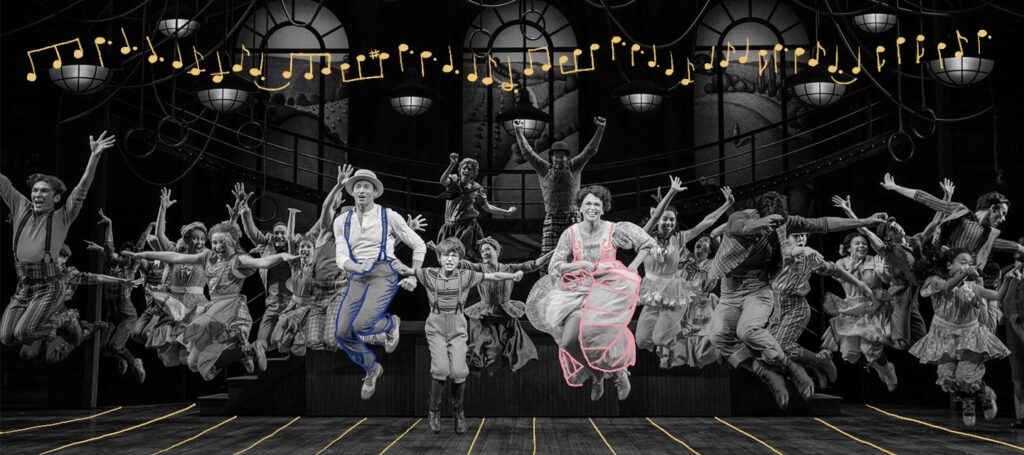


We Don’t Want What ‘The Music Man’ is Selling
If there’s one thing this revival of The Music Man has it’s fanfare. Both literal (a marching band played outside the theater on opening night) and figurative: since this production was announced it has been loudly heralded as a major moment for Broadway, best signaled by the comically large marquee that adorns the roof of the Winter Garden Theatre. The show’s publicist even described this revival as “Broadway history in the making.”
After sitting through opening night (critics were barred from previews, so we all furiously typed away our reviews right after leaving the theater) I can say that this show did feel like part of Broadway history—not “history” as in a precedent-smashing achievement or success, but “history” as in dated, part of the past, a nostalgia-fueled replica of one of the previous revivals. Everything about this revival of The Music Man felt generic, it never justified its existence.
The show by Franklin Lacey and Meredith Willson tells the story of musical theater’s favorite grifter and pathological liar, Harold Hill, who cons some Iowans by falsely claiming he will form a band for young boys and manages to woo the local librarian, Marian. After having barely survived Trump, The Music Man hits a bit too close to home. It becomes especially painful by the end when we are asked to forgive Harold and accept that Marian has fallen for him. Everything works out, happily ever after awaits.
Marian’s complicity here is particularly frustrating: in 2022, it is incomprehensible how or why the smartest woman in town would let Harold get away with his con and end up with him romantically; he’s hot, but that surely isn’t enough, right?
This hard-to-swallow ending, combined with the signature over-the-top stylings of Jerry Zaks (and Scott Rudin) makes watching this musical feel like being force-fed an overly sweet dessert, and not even a particularly beautiful one. Santo Loquasto’s drab, earth-tone costumes, Brian MacDevitt’s oddly dim lighting, and, most egregiously, Loquasto’s lackluster set design consisting of cartoonish trees and never-ending bland backdrops made this high-budget revival look like a rented production package for high schools and community theaters.
This Music Man’s reliance on an old-school, Golden Age nostalgia, brings up bigger questions about the state of revivals on Broadway. In recent years Hello, Dolly! seemed to be the gold standard for revivals: sumptuously designed, impeccably directed, and featuring a beloved star–the perfect crowd-pleaser. While the same team (Zaks, Carlyle, Loquasto, Rudin, etc.) is behind this revival of The Music Man, the formula doesn’t work here. So what changed?
For one thing, The Music Man is no Hello, Dolly! While both may be classics filled with great songs, The Music Man’s messy message sits poorly in the current political climate. Furthermore, Broadway, and the world, have changed since Bette Midler (and Bernadette Peters and Donna Murphy) walked down the stairs at the Harmonia Gardens. In the years since, we had Daniel Fish’s Oklahoma!, which changed the expectations and rules for revivals, raising the bar and reflecting how audience tastes are changing, moving away from nostalgia and into more political, cutting-edge, and newly relevant interpretations of classics.
Likewise, over the pandemic, Broadway had many reckonings about inequality. Watching this revival you certainly wouldn’t know; the lead characters are all played by white actors, the design team is entirely male, and the production does not offer any new or politically informed interpretations. I had the slight hope that this revival might explore the sex-shaming and prejudice at the center of Marian’s plot, make explicit Winthrop’s parentage, or have a less happy ending for Harold. Alas, the creative team clearly had no desire to think critically about The Music Man or offer anything new.
In theory, the appeal of this production is its lead stars (whose oversized names in the marquee would make you think the show is named after them), Hugh Jackman and Sutton Foster. Jackman is competent but perfunctory and generic; his Harold Hill could be anyone else’s. Foster, on the other hand, is a great Marian, expertly finding the comedy in the role. Sadly, she is vocally miscast and her strong mezzo belt voice is in constant tension with Marian’s classic soprano. Both manage to falter at what should be high points: Jackman’s “Ya Got Trouble” and Foster’s “My White Knight” (taken down a few steps and sped up) both fall flat.
Warren Carlyle’s demanding-as-ever choreography is energetic and often fun, and is expertly executed by the large and impressive ensemble, but is not nearly as well done as his work on Kiss Me, Kate or Hello, Dolly!. The Music Man is known for its huge production numbers, but other than the stunning “Seventy-Six Trombones,” and a great curtain call, this revival is lacking in energy (especially in the second act). Numbers like “Ya Got Trouble,” “The Wells Fargo Wagon,” and even “Shipoopi” disappoint, feeling either rushed or not staged with enough gusto.
“Shipoopi,” with its altered lyrics, is indicative of a larger problem, namely how offensive material was cut out without putting much thought into fixing it or addressing the larger issues inherent in the musical. For instance, it’s time to address Winthrop: I was shocked that in 2022 we can still stage a Broadway musical in which a child actor is instructed to over-act a lisp so that the audience can laugh at a child’s speech impediment.
The refrain of “Shipoopi” was changed from “the girl who’s hard to get” to “the boy who tries his best,” which made me wonder: did anyone creatively involved with this revival try their best? It appears that they just went through the motions, feeding the script of The Music Man into a nostalgia revival machine with the hopes that audiences would lap it up, just as Harold Hill assumes he’ll be able to fool the citizens of River City.
Well, they can’t fool us anymore. We’re not buying their bugles or falling for their smooth-talking, slippery song and dance. We don’t want what they’re selling. We’re too smart for that routine now.
Keep Reading

‘Prayer for the French Republic’ is a Sweeping Family Drama
A multi-generation Jewish family dealing with the legacy of their business told over three hours and three acts on a turn-table set. It’s not The Lehman Trilogy (though the summary also fits), but Joshua Harmon’s latest play, Prayer for the French Republic. Harmon, known for Bad Jews, Significant Other, Admissions, and Skintight, here has hit […]
Read More
‘MJ’ Trips Into the Bio-Musical Morass
MJ, the new Broadway musical about Michael Jackson’s life, is currently thrilling audiences at the Neil Simon Theatre for all the wrong reasons. The show follows MJ―who functions as our narrator―as he balances getting his Dangerous world tour off the ground with interruptions from a documentary filmmaker for MTV who wants an exciting scoop, and […]
Read More












